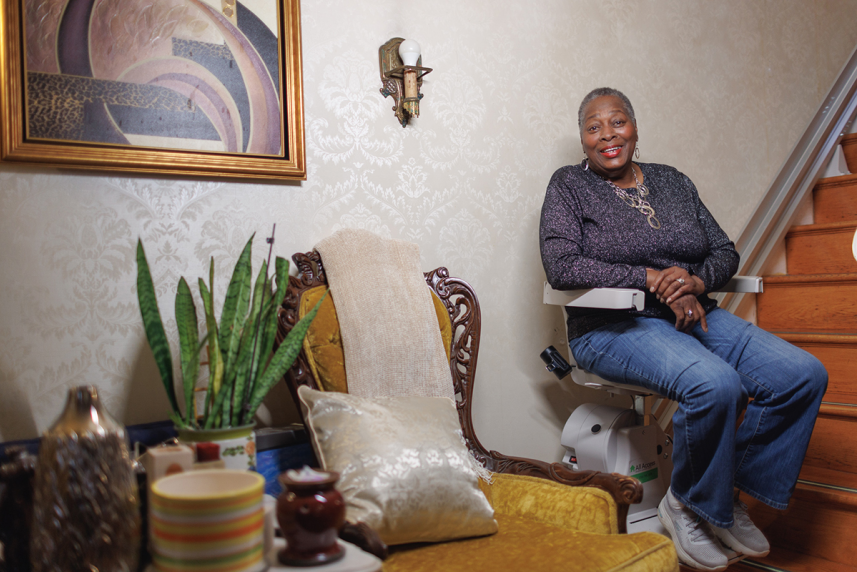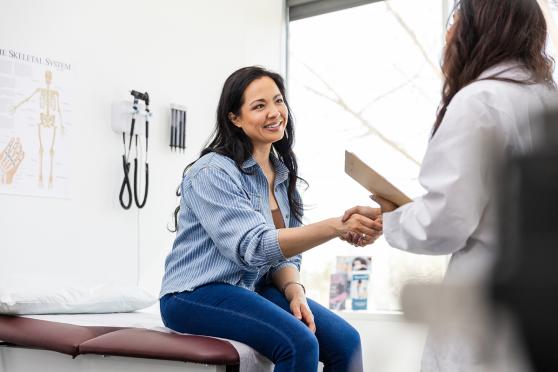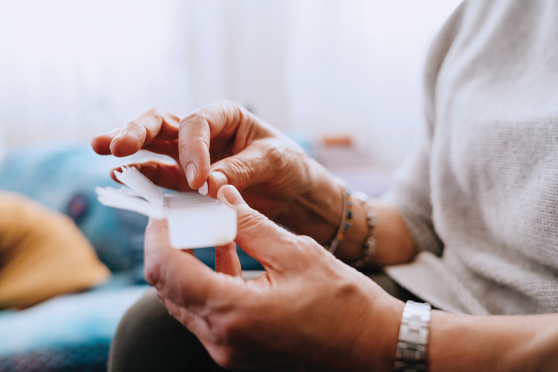An old home with new tricks
Caroline Mallory spent years struggling to get around her home. Now, thanks to a free program from PHDC, she's moving with ease.
Photographs by Matt Stanley

To get from her bedroom to the kitchen, Caroline Mallory must travel down 14 wooden steps. These used to cause her pain and anxiety. Over the years, as her mobility grew more limited, they came to represent a significant risk to her health. As a result, things would pile up at the top and bottom, waiting for one of her children or grandchildren to come by and carry them up or down. When her pain was flaring up, she’d sit on the top step and drop down on her bottom, one step at a time.
Today, Caroline, 72, doesn’t have to do that. In October, PHDC installed a stair glide to carry her over the steps. “I wish I had this years ago,” she says. “I use it all day, every day.”
PHDC is a nonprofit dedicated to improving Philadelphia neighborhoods. Through its Adaptive Modifications Program, it installs free safety upgrades in the homes of low-income people with permanent disabilities.
In 2021 and 2022, the organization completed 323 jobs similar to Caroline’s. These included wheelchair lifts, widened doorways, lowered sinks and countertops, and other improvements that allow people to live safely in their own home.
Caroline recalls when a friend first told her about the program. Initially, she brushed it off. She’d already installed a first-floor bathroom, and she knew how to scooch down the stairs. But she kept thinking about it — wondering if her life could be a bit easier and safer.
Some 40 years ago, Caroline learned she had bilateral sciatica. Since then, she’s been diagnosed with fibromyalgia, degenerative disc disease, and arthritis. “I have a little bit of everything.” She laughs, but it wasn’t always funny.
“I will not let what I can’t do keep me from doing what I can do.”
Chronic pain forced her to give up activities like biking early in life. She raised four kids, and the physical demands were often too much. She had to lean on the charity of neighbors to get by. “Even picking up my children was something I couldn’t do,” she says.
There were the little things, too. In 1997, when The Lion King came to the stage in New York City, Caroline bought tickets. But when the time came, she was in too much pain to leave her home. “I’m still upset about that to this day,” she says.
Despite the struggles, Caroline was committed to her home. She bought the three-bedroom brick home in 1978 and had no desire to leave. As she started to think about her future, she softened to the idea of asking for help.
One day, while she was outside the PHDC office, she popped in and applied for all the adaptive home modifications they offered. In 2021, after an interview and home exam, PHDC’s contractors went to work. They installed grab bars and handrails around her toilet, in her shower, and outside her front door. They also ran an iron handrail down the stairs.
The handrail proved to be potentially lifesaving. One day, Caroline’s foot slipped. Without the handrail to catch herself, she may have tumbled all the way to the bottom. Instead, she wound up rattled and sore, but otherwise okay.
The fall helps explain why PHDC ultimately replaced it with the stair glide. It was a full-day installation. The motor requires its own power line, which, in Caroline’s case, required a new breaker box. PHDC sent an electrician to handle everything for free.
Now, Caroline is talking with PHDC about the next project. She’s looking to outfit her upstairs bathroom with more handrails and a walk-in shower.
She still lives with pain, but she knows she has options to help make her day-to-day life more comfortable. “I have a saying,” she says. “‘I will not let what I can’t do keep me from doing what I can do.’” If she can make her home a safer place to live then by all means, she’ll do it.


